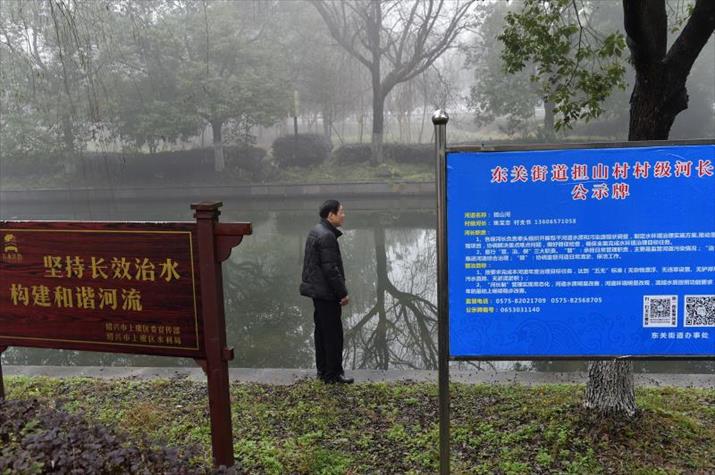|
||||||
|
||||||
| Home Nation World Business Opinion Lifestyle Multimedia Documents Special Reports Africa Travel |
|
||||||
|
||||||
| Home Nation World Business Opinion Lifestyle Multimedia Documents Special Reports Africa Travel |
| Nation |
| Environmental Protection Trumps GDP Growth |
| New criteria introduced for assessing government officials based on environmental efforts |
| By Hou Weili | NO. 16 APRIL 20, 2017 |
 Yao Baozhong, chief of Danshan Village, Shangyu District of Shaoxing in Zhejiang Province, is responsible for the protection of a river near his village (XINHUA)
Although winter is fast fading into spring in north China's Hebei Province, the almost daily curtains of smog that cover the region are a great cause of concern for Jiang Ting, a 30-year-old new mom. Apart from inconveniences to life and work brought by the severe air pollution, Jiang worries about the harm to her health, and especially to that of her vulnerable child. Statistics released by China Meteorological Administration showed severe continuous smog clouded China's Beijing-Tianjin-Hebei region on eight occasions from November 2016 to early February 2017. "Indeed, our generation grew up in an affluent environment, but the sky is no bluer than the time when I was a kid," Jiang said, adding her expectation was to have more days with blue skies. While seeing an improvement in the livelihood of both her family and the local community over the past three decades, Jiang said she also saw the negative side of this development, namely how the environment was gradually polluted. This was an unexpected result of some local governments' pursuit of ever-higher GDP figures at the expense of the environment. The good news is that Jiang's dream for blue skies is on the way to being realized as China embraces new reforms for the evaluation of its officials. For the first time since the late 1970s—when China adopted its reform and opening-up policy—government officials' commitment to environmental protection will be given higher priority than GDP growth in evaluating their administrative performance. Changing priorities On January 12, Zhao Chenxin, spokesperson of the National Development and Reform Commission, said at a news briefing that China would implement a new assessment mechanism for government officials. The new criteria under which officials' performance would be evaluated would mainly be based on environment-related indicators, including the utilization of resources, environmental quality, ecological protection, green lifestyle promotion and public satisfaction. Under the new mechanism, indicators related to economic growth carry a weight value of only 9.2 percent, less than half of that related to the environment such as the adequate utilization of resources and environmental quality, which stand at 29.3 percent and 19.2 percent, respectively. More specifically, the level of atmospheric particulate matter that has a diameter of less than 2.5 micrometers (PM 2.5) is weight-valued in the new mechanism at 2.75 percent. Officials in China are evaluated every year and receive a general assessment every five years. Previously, GDP growth was the most important criterion in these processes. Experts believe that highlighting the environment-related indicators in the new mechanism means that China's economic performance is shifting from focusing on growth rates to ensuring people's well-being. "The indicators and mechanism are designed to guide local governments to place improving people's well-being in various aspects at the center of their work, pushing officials to step up efforts on improving the quality of the environment," said Zhao. Huang Langhui, former chief of the enterprise investigation team of the National Bureau of Statistics, noted that this symbolized a major change in China's development mode. "Environmental pollution is such an imminent issue that it threatens people's health and social stability. The whole of society has reached a consensus that rapid economic growth at the expense of a polluted environment is meaningless," he said. The green development in the area surrounding the Taihu Lake in Suzhou, Jiangsu Province, has achieved good results (XINHUA)
Implementation is key Proper execution is key to controlling pollution as well as reforms. "Assessment and evaluation by superiors lights the way for officials. The direction it leads to should be the goal officials fight for," said media commentator Li Yiling. He argued that the target of green development would be easily reached if the impulse for pure GDP growth was contained. However, it is no easy task to change an embedded GDP-oriented evaluation mechanism overnight and implement the new standards. "When it comes to implementation, it is difficult to collect statistics about these indicators. Therefore, most countries in the world still evaluate officials with GDP growth as the principal reference," said Hu Chi, a researcher at the State-Owned Assets Supervision and Administration Commission of the State Council. Li also argued that it was predictable that local governments would continue to compete with each other in terms of GDP growth. "In the current stage, the tendency of judging officials based on the local economy, both by the higher authorities and the public, may continue as it is a simpler criterion," said Li. "Actually, it is good for officials to be evaluated from various aspects, because economic growth rates may vary in different regions due to unique natural resources endowments, innovation ability, and stage of industrialization." Chai Fahe, a researcher from the Chinese Research Academy of Environmental Sciences, praised the new environmentally focused assessment method. "It shows the Central Government is placing unprecedented emphasis on combating air pollution. However, it should be cautious in case some local officials falsify statistics about pollution control to reach the assessment criteria," he warned. To avoid this, Li suggested zero-tolerance toward officials falsifying statistics and inviting the public to monitor officials. "A further detailed evaluation system should be put in place and results of the assessment should be made known to the public," he said. Copyedited by Bryan Michael Galvan Comments to zanjifang@bjreview.com |
About Us | Contact Us | Advertise with Us | Subscribe
|
||
| Copyright Beijing Review All rights reserved 京ICP备08005356号 京公网安备110102005860号 |